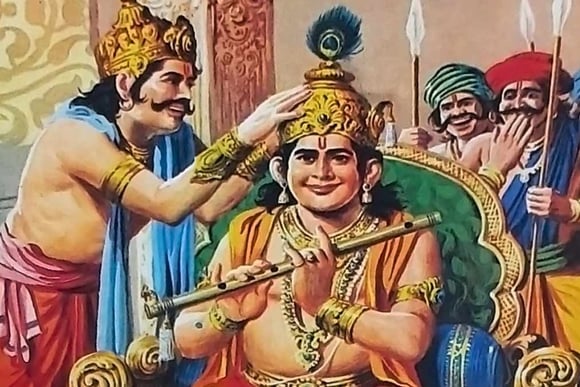The Peacock King and the Chariot King: A Tale of Two Egos The Peacock King and the Chariot King: A Tale of Two Egos
1/7/20242 min read
In the shimmering city of Dwaraka, bathed in the golden warmth of the sun, a shadow of envy darkened the hearts of two kings. Paundraka, draped in gilded finery, mirrored the divine attire of Krishna, the city's beloved ruler. His heart, consumed by ambition, churned with a single desire: to dethrone Krishna and claim the mantle of supreme king.
Fuelled by this insatiable urge, Paundraka marched upon Dwaraka, his army a glittering serpent slithering towards its prey. The battle that ensued was a whirlwind of clashing steel and thundering war cries. Yet, Krishna, with his brother Balarama and unwavering friend Satyaki by his side, emerged victorious.
Paundraka, his ego bruised but not broken, fled to Kubera, the celestial lord of wealth, seeking aid against his nemesis. But Kubera, a sage steeped in wisdom, saw through Paundraka's corrupted vision. He refused to fuel the flames of his folly, sending him back empty-handed and burdened with disappointment.
Undeterred, Paundraka, blinded by rage and desperation, returned to Dwaraka. Kubera, sensing his friend's descent into darkness, bestowed upon him powerful weapons, hoping to deter him from the path of self-destruction. But in Paundraka's twisted mind, these gifts became tools of vengeance, instruments to fuel his burning ambition.
The final battle echoed through the streets of Dwaraka, shaking the very foundations of the city. Krishna, ever the protector, met Paundraka's aggression with measured force. He pleaded with his friend to renounce his delusions, to embrace reason over madness. But Paundraka, deaf to every plea, remained consumed by the seductive whisper of his own grandeur.
With a heavy heart, Krishna knew the only way to stop the bloodshed was to sever the very illusion that fueled Paundraka's descent. With a flash of blinding light and a deafening roar, Krishna unleashed his Sudarshana Chakra, a divine disc that symbolizes cosmic justice. The impact was swift and final, shattering Paundraka's reign of terror and restoring peace to Dwaraka.
In the aftermath, a hush fell over the city. The air, heavy with the ghosts of ambition and regret, resonated with the echoes of a tragic lesson. Paundraka's tale serves as a stark reminder that unchecked ego is a venomous serpent, poisoning not only its bearer but also those around them. It whispers delusions of grandeur, blinding us to the path of righteousness and peace.
The fall of Paundraka is not a celebration of violence, but a lament for the tragic consequences of unchecked pride. It reminds us that true strength lies not in conquering others, but in mastering our own minds and hearts. It beckons us to choose forgiveness over vengeance, and seek harmony over dominance.
For only by embracing humility and seeking understanding can we create a world where kings and men alike reign with wisdom and grace, and where the shadows of self-serving ambition never again darken the sun-kissed horizon of peace.
This tale, woven with threads of betrayal, ambition, and ultimately redemption, challenges us to look inward and confront the seductive whispers of our own egos. It is a call to choose compassion over conflict, for only then can we find true fulfillment and build a world where the legacy of Paundraka becomes not a cautionary tale, but a distant echo in the symphony of human progress.



